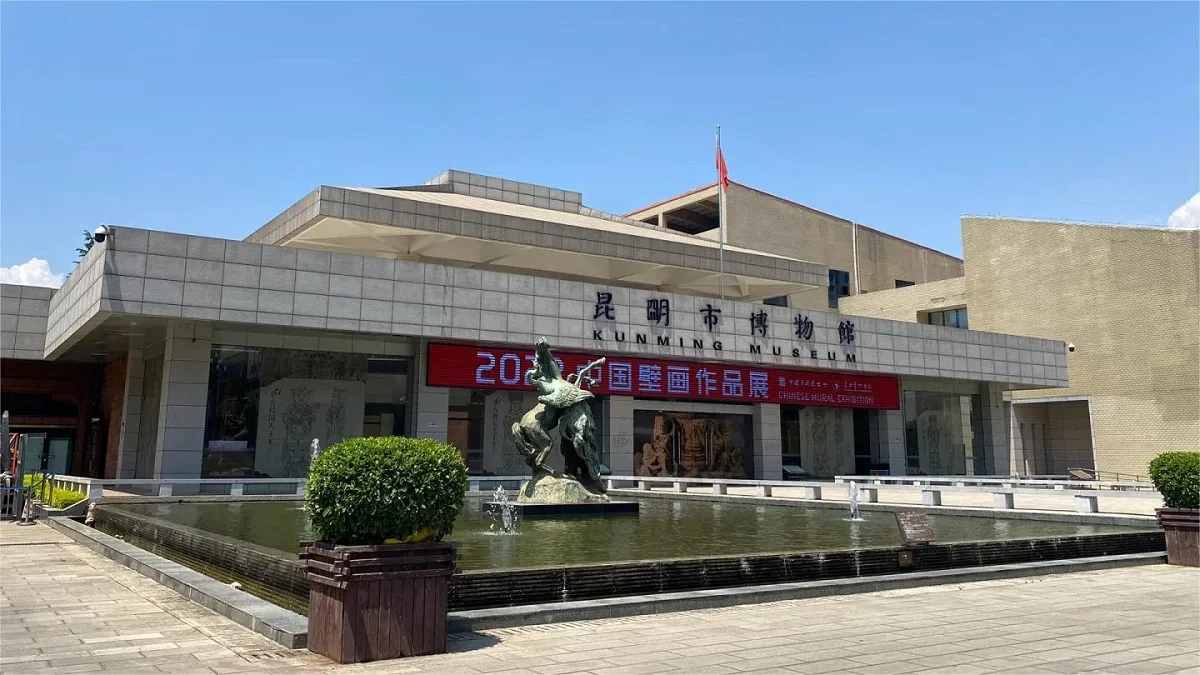The Kunming Museum (昆明市博物馆), established in 1982, spans an area of 18,000 square meters, making it a significant comprehensive museum in the region. Within its walls, visitors can explore various exhibitions showcasing cultural treasures, including bronze artifacts, Buddhist scripture pillars from the Dizang Temple, dinosaur fossils, the Kunming Flying Tigers Memorial Hall, exquisite fans, fine porcelain, and vintage photographs of old Kunming. Additionally, the museum features three flexible exhibition halls where temporary exhibitions on various themes are periodically hosted.
Standing prominently in the center of the Kunming Museum is the renowned Song Dynasty Dali Kingdom Buddhist scripture pillar, revered as a national treasure of ancient Chinese sculptural art. Known as the “Dizang Temple Scripture Pillar” due to its origins from the former site of the Dizang Temple, it is colloquially referred to as the “Ancient Pillar.” Discovered in the ruins of the temple in 1919 after its collapse, this remarkable artifact has captivated audiences both domestically and internationally with its unparalleled beauty and historical significance. The Kunming Museum serves as a cultural beacon, preserving these invaluable relics and offering visitors a glimpse into the rich heritage of Kunming and beyond.
Table of Contents
Basic Information
| Estimated Length of Tour | 1 – 2 hours |
| Ticket Price | Free |
| Opening Hours | 9.00 – 17.00; Last admission: 16.30 Closed on Mondays |
| Telephone Number | 0086-0871-63306314 0086-0871-63153256 |
Location and Transportation
The Kunming Museum is situated in the southeastern part of Kunming City, at 93 Tuodong Road, Kunming, Yunnan Province, China, near the Flying Tigers Meseum. To get there, you can choose one of the following ways:
Bus: Take bus 1, 62, 145, 213, or A1 and get off at Municipal Museum Stop (市博物馆站).
Metro: The closest metro station to Kunming Museum is Chajie (岔街) on line 6. After getting out of the station from Exit D, walk about 400 meters to the west to reach the museum.
Exhibitions in Kunming Museum

Bronze Culture Exhibition: This exhibition primarily features bronze artifacts excavated from various sites, including the 71st royal tomb at Shizhaishan in Jinning, the tomb complex of the Tianzimiao in Chenggong, and the tomb complex of Shibei Village in Chenggong. These artifacts provide insights into the bronze culture of ancient Yunnan.
Dizang Temple Scripture Pillar: The Dizang Temple Scripture Pillar, carved from red sandstone, stands at 6.5 meters tall. It is intricately carved with Buddhist deities, bodhisattvas, heavenly kings, guardians, and other divine figures, totaling over 300 statues. The pillar is adorned with inscriptions in both Chinese and Sanskrit, including texts such as the “Construction Record,” the “Heart Sutra,” and various mantras.

Dinosaur Fossil Exhibition: This exhibition features dinosaur fossils discovered in Yunnan, including specimens of the Shuangmiao Long, Jushuo Yunnan Long, and Lufeng Long. Visitors can also see models of the Gan Sichuan Long and the Tianfu Emei Long, as well as over 60 dinosaur skeletal fossils and nearly 30 footprint fossils from Xiyang Township in Jinning.
Fine Porcelain Exhibition: The exhibition showcases exquisite blue-and-white porcelain from the Ming Dynasty, including pieces from local kilns in Yunnan such as Jian Shui Kiln and Yuxi Kiln, as well as porcelain from Jingdezhen kilns brought in through military and civilian settlements.

Old Photograph Exhibition: This exhibition presents over 100 carefully selected old photographs depicting scenes from Kunming and Yunnan over a century ago. These images capture the arrival of French missionaries, traders, teachers, engineers, and diplomats in Yunnan, showcasing landmarks, street vendors, bustling markets, and curious faces from the past.
Flying Tigers Memorial Hall: The memorial hall houses artifacts and memorabilia related to the legendary Flying Tigers, including iconic leather jackets worn by squadron members, model aircraft, canteens, holsters, combat knives, flying goggles, and historical documents.


